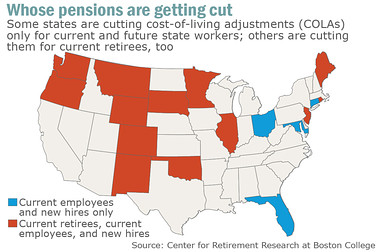California: Overprotecting Public Employee Pensions
< < Go Back
California courts have ruled that public employees have a right to maintain their pension levels, making it difficult for the state to enact pension reform. Alexander Volokh, economist and professor at Emory Law School, explains the effect of the rule in a new report from the Reason Foundation.
The U.S. Constitution’s Contract Clause reads, “No State shall…pass any…Law impairing the Obligation of Contracts.” Additionally, most states have contract clauses within their own constitutions.
That clause has been applied to pension plans — “contracts” between public employees and state and local governments. But while some states have ruled that prospective retirement plan modifications do not violate the Contract Clause (believing that benefits do not vest until they are earned), California courts disagree. In California:
– Public employees “acquire a vested right to a pension” when they accept public employment.
– Furthermore, California courts have ruled that the right to a pension is “based on the system then in effect,” meaning that the employee has the right to continue to earn benefits according to the same generous terms that applied when he began his employment.
While courts will allow some modifications to pension plans, the changes must be “reasonable” and disadvantages must be “accompanied by comparable new advantages.” This is known as the “California rule,” an approach followed by twelve states.
Because the rule limits the ability of public employers to change benefits, the state may offer less generous benefit packages up front.
The California rule gives states little leeway in the case of a fiscal emergency, especially as any pension modifications require the state to offer new advantages to compensate for those disadvantages.
More From NCPA:




